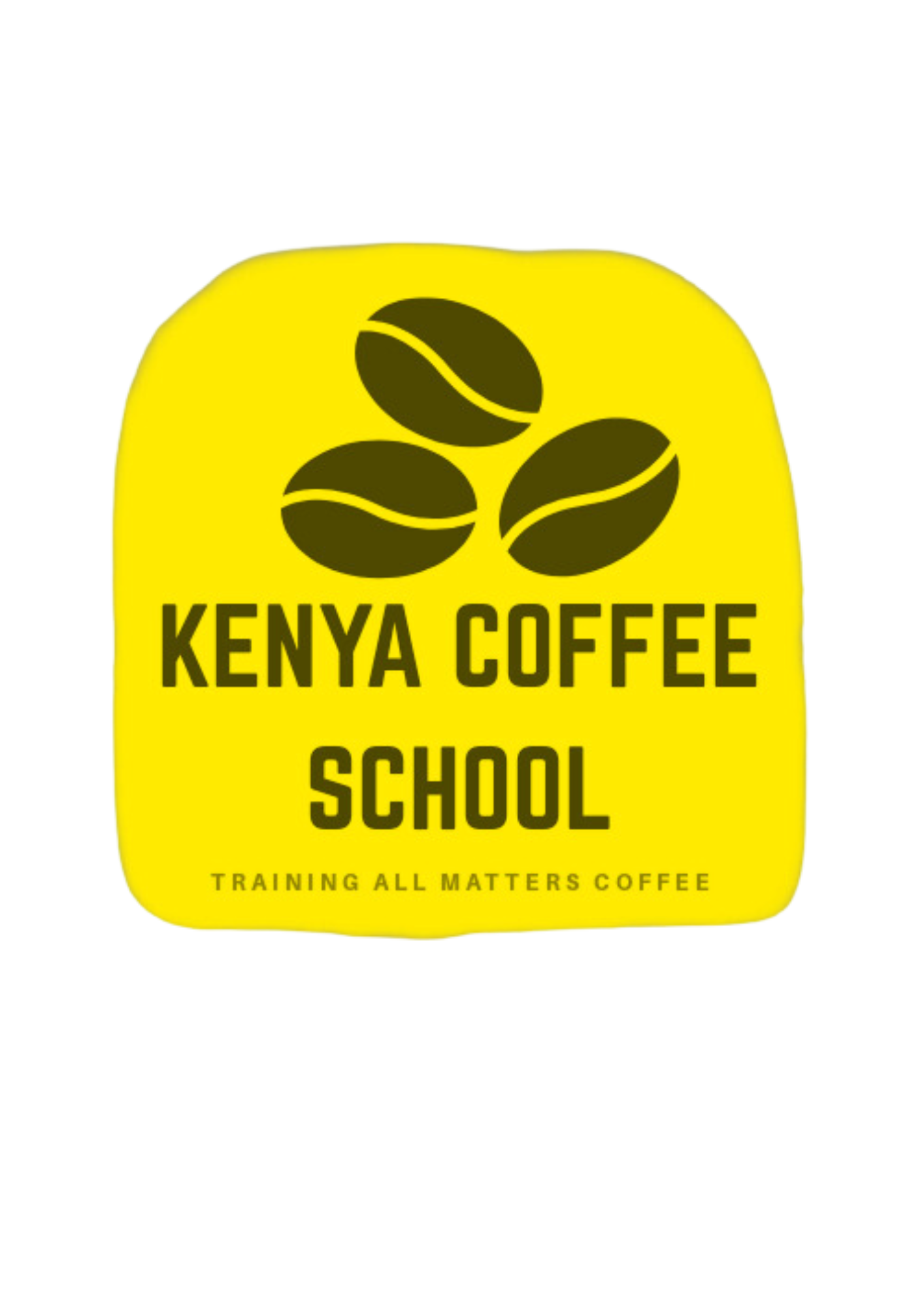Kenya Coffee School – Kenya Coffee Digitalisation Program (KCDP)
Digitalisation of Coffee: Enhancing Sustainability and Market Access Through Kenya Coffee School’s Certification Program
1. Introduction
The coffee industry is undergoing a digital transformation that enhances sustainability, improves market access, and empowers farmers through technology. Kenya Coffee School (KCS) proposes a Digital Coffee Certification Program to equip farmers, roasters, and baristas with digital skills that improve efficiency, traceability, and profitability.
Why Digitalisation in Coffee?
- Enhances sustainability through precision farming, reduced waste, and efficient resource management.
- Connects farmers to global markets, eliminating middlemen and increasing profitability.
- Promotes local coffee consumption by introducing affordable small-scale roasting (e.g., 4A roasters).
- Ensures transparency in the coffee value chain through blockchain and IoT (Internet of Things).
This concept outlines how Kenya Coffee School will implement digital coffee training, certification, and market linkage to drive sustainability and economic growth in Kenya’s coffee sector.
2. The Need for Digitalisation in Kenyan Coffee
Challenges in Kenyan Coffee Farming
- Limited Market Access – Farmers rely on brokers, losing up to 40% of potential earnings.
- Low Local Consumption – Only 5% of Kenyan coffee is consumed locally due to lack of roasting knowledge and infrastructure.
- Climate Change Vulnerability – Traditional farming methods struggle with unpredictable weather.
- Post-Harvest Losses – Poor storage and processing lead to 15-20% waste.
How Digitalisation Solves These Problems
- Mobile Apps for Farmers – Real-time weather data, pest control alerts, and best farming practices.
- Blockchain Traceability – Buyers track coffee from farm to cup, ensuring fair prices.
- E-Commerce Platforms – Farmers sell directly to roasters and consumers.
- Digital Roasting Training – Affordable 4A roasters enable local value addition.
3. Kenya Coffee School’s Digital Coffee Certification Program
Program Objectives
- Train farmers, agronomists, and roasters in digital coffee tools.
- Certify participants in Coffee Digital Skills to improve employability and business opportunities.
- Link farmers to direct markets via digital platforms.
- Promote local coffee consumption through small-scale roasting education.
Course Modules
| Module | Description | Target Audience |
|---|---|---|
| 1. Digital Coffee Farming | IoT sensors, mobile apps for crop management | Farmers, Cooperatives |
| 2. Blockchain & Traceability | How to use blockchain for transparent trade | Farmers, Exporters |
| 3. E-Commerce for Coffee | Selling on platforms like Amazon, Alibaba | Farmers, SMEs |
| 4. Digital Roasting & Brewing | Using 4A roasters, roast profiling apps | Baristas, Roasters |
| 5. Coffee Data Analytics | Using AI for yield prediction, market trends | Agronomists, Traders |
Certification Levels
- Basic (Bronze) – Digital farming & traceability
- Intermediate (Silver) – E-commerce & roasting
- Advanced (Gold) – AI, IoT, and coffee tech entrepreneurship
Knowledge of Coffee Skills as the Certification Benchmark
To ensure credibility and standardization, the Kenya Coffee School Certification Program will use the “Knowledge of Coffee Skills” (KCS) framework as its benchmark. This framework evaluates participants on:
- Technical Proficiency
- Understanding of coffee processing methods (washed, natural, honey).
- Mastery of roast profiles and brewing techniques.
- Competency in digital tools (IoT, blockchain, e-commerce).
- Sustainability Practices
- Water and energy-efficient farming techniques.
- Waste reduction in post-harvest processing.
- Carbon footprint management in roasting.
- Business & Market Skills
- Direct trade and export regulations.
- Branding and marketing for local and international markets.
- Financial literacy for coffee entrepreneurs.
- Sensory & Quality Control
- Cupping and grading (SCA standards).
- Defect identification and quality assurance.
Certification Process:
- Theory Exam (Online/Offline) – Tests knowledge of coffee science, digital tools, and sustainability.
- Practical Assessment – Hands-on tasks (e.g., roasting, cupping, using blockchain apps).
- Case Study Submission – Solving real-world coffee industry challenges.
4. Implementing Affordable 4A Roasters in Kenya
What is a 4A Coffee Roaster?
- Affordable (Under $1,000)
- Adaptable (Suitable for small-scale farmers)
- Automated (Digital roast profiling)
- Accessible (Easily maintained with local parts)
How Digital Training Supports Roaster Adoption
- Online Roasting Courses – Teach optimal roast profiles for Kenyan coffee.
- Mobile Roasting Apps – Monitor temperature, time, and bean development.
- Local Roasting Hubs – Farmers collaborate to roast and brand their coffee.
Impact on Local Consumption
- Farmers can now roast and sell premium Kenyan coffee locally.
- Reduces dependency on exports, increasing profits by up to 300%.
- Creates new jobs in roasting, packaging, and café businesses.
5. Digital Tools for Coffee Sustainability
A. Precision Agriculture (IoT & Drones)
- Soil moisture sensors reduce water waste.
- Drones monitor pest infestations early.
B. Blockchain for Fair Trade
- Buyers scan QR codes to see farm location, harvest date, and farmer details.
- Ensures direct payments, eliminating exploitative middlemen.
C. AI-Powered Marketplaces
- Algorithms match farmers with international buyers at best prices.
- Predictive analytics help farmers decide when to sell.
6. Expected Outcomes & Economic Benefits
| Metric | Before Digitalisation | After Digitalisation |
|---|---|---|
| Farmer Income | $1.20/kg (Auction price) | $4.50/kg (Direct trade) |
| Local Consumption | 5% | 25% (via roasting hubs) |
| Post-Harvest Loss | 20% | <5% (smart storage) |
| Youth Employment | Low | High (tech-driven jobs) |
Long-Term Sustainability Impact
- Carbon footprint reduction (efficient farming & roasting).
- Gender inclusion (women access e-commerce easily).
- Climate resilience (data-driven farming).
7. Conclusion & Call to Action
Why Kenya Coffee School’s Certification Matters
- Bridges the digital divide in coffee farming.
- Makes value addition accessible to smallholders.
- Positions Kenya as a leader in sustainable coffee tech.
Next Steps
- Pilot Program – Train 500 farmers in 2025.
- Partnerships – IBM (Blockchain), Safaricom (Mobile Money), ICO (Market Access).
- Scale Nationwide – Government & NGO support for wider adoption.
“Digital coffee is the future—Kenya Coffee Industry is in dire need of Digitalisation!”


